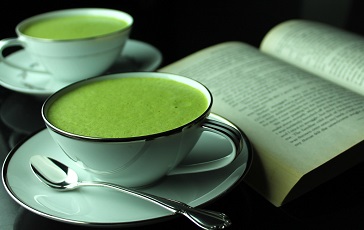


 One may wish to know how to make matcha tea for numerous reasons, the health benefits of consuming green tea, the fact that the entire leaf is consumed when drinking matcha tea (as opposed to just water extract), the elegance of Japanese tea traditions, or the fact you are making it yourself. Different consistencies can be obtained, both thin (Usucha) and thick (Koicha), this article will detail how you can brew the best cup of matcha tea possible.
One may wish to know how to make matcha tea for numerous reasons, the health benefits of consuming green tea, the fact that the entire leaf is consumed when drinking matcha tea (as opposed to just water extract), the elegance of Japanese tea traditions, or the fact you are making it yourself. Different consistencies can be obtained, both thin (Usucha) and thick (Koicha), this article will detail how you can brew the best cup of matcha tea possible.
A cup of matcha tea has numerous benefits and can be made very easily at home. Simply follow the steps below:
Know how to make matcha tea step by step here:
You have learned how to make matcha tea, but do you really know the benefits of drinking this tea? If not, here are 8 benefits that will make you love matcha tea more!
Antioxidants have numerous benefits on one's health, including disease prevention, UV protection and anti-aging benefits. Many consume antioxidants through raw vegetables and fruits among other sources, but matcha tea has around five times more antioxidants than them.
What's more, a specific type of antioxidant, known as catechin, is abundant in matcha green tea. Epigallocatechin gallate or EGCg takes up about 60% of all catechins, which is the most widely recognized antioxidant to pertain cancer fighting properties.
Matcha green tea contains L-Theanine, an amino acid, which helps to calm and relax one's mind without causing drowsiness. You can use matcha tea to calm you down whilst remaining alert.
L-Theanine also helps in dopamine and serotonin production which have numerous effects on one's state of mind, including helping to improve concentration, memory and mood.
Matcha green tea was once drunk by samurai before battle to attain energy for the fight. The energy one gets from matcha tea is largely due to the high level of L-Theanine within matcha tea as opposed to the caffeine that all green tea contains. This means learning how to make matcha tea and consuming it regularly can give you good, clean, long lasting energy without the side effects pertaining to a caffeine boost.
The catechins in matcha tea contain antibiotics which can help improve overall health. Besides, matcha tea has a high amount of vitamins A & C, potassium, iron, calcium and protein, which help to build your body. Some studies have also suggested that the nutrients fund within matcha tea can help to inhibit the effects of HIV on human T-cells.
Although the reason is yet to find out, results of studies among different populations show that matcha tea can reduce levels of bad cholesterol (LDL), whilst improving levels of good cholesterol (HDL).